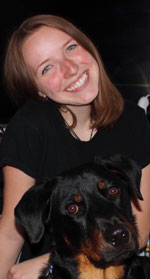
The Flagstaff Chapter of the Arizona Hydrological Society (AHS) 2021 AHS Undergraduate Mentor Scholarship was awarded to Northern Arizona University student, Mallory Rakowski.
As part of the student responsibilities of the mentor scholarships, award winners must submit a short article to the AHS monthly newsletter describing their school experience in 2021, including how COVID-19 influenced their experience. Please take the time to read Mallory’s report.
School Experience of 2021
Submitted by Mallory Rakowski
Through the AHS Undergraduate Mentor Scholarship I was able to attend four hydrology related meetings both virtually and in person. The mentorship began with meeting my mentor, Don Bills. Don and I spoke about my previous experience/knowledge of the field and where my interests lie in addition to what I would like to learn more about. Through this, Don helped to gear my mentorship to aid in my educational and career goals by finding meeting opportunities within Arizona. The four meetings I attended were the Flagstaff Water Commission Meeting, the Coconino Plateau Watershed Partnership meeting, a NAMWUA meeting, and lastly, I was able to go in person to the Fort Tuthill well site #2 to watch an aquifer test. Throughout the meetings I kept notes of the topics discussed along with questions for either myself to look into later or to ask Don as we debriefed after each meeting.
Although three of the four meetings were virtual, I was able to gain a lot of knowledge from the experience and Don was wonderful at adapting to a mix of virtual and in person meetings. At the water commission meeting the focus was the water consumption and water demand development project here in Flagstaff, in addition to information about a reclaimed water seepage study. Through this meeting I learned about geophysics technology (CSAMT – controlled-source audio magnetotellurics) used to provide profiles of the subsurface; prior to this, I had not been exposed to such technologies in my studies. The meeting focused heavily on the potential recharge of groundwater aquifers using reclaimed water, which is an interest of mine. This led to further discussion between Don and me pertaining to pharmaceuticals in effluent wastewater and how we can monitor the levels within the aquifer.
At the CPWP meeting, the main topic discussed was the streamflow gages within the Coconino Plateau. This meeting showed the importance of funding and effective communication, as many different parties benefit from the use of the streamgages. This meeting also sparked conversations about how to determine the difference between water level changes due to things such as groundwater pumping vs. climate change. Another important note of this meeting was introduced by a representative from Navajo Nation who discussed the importance of stream gages for ongoing drought reports on Navajo Nation land and the importance of monitoring in areas such as near the old Peabody mine site.
At the NAMWUA meeting I learned that they began with a goal of providing a renewable source of water supply, and they participate in joint studies and projects. The meeting consisted of multiple members of the group giving updates on the water resources in their area. My biggest takeaways from this meeting pertained to the arsenic removal plants, which I had not previously learned about or heard of prior to this meeting. It was also interesting to see where each area of AZ obtained their water from whether that be GW, SW, reclaimed water, etc. In the meeting it was also mentioned that in one area they had seen a decreasing trend in water use for multiple years in a row, except for 2020. The increase in water use was attributed to increasing temperatures and populations and to COVID. This led to conversations pertaining to how COVID affected water use in general, in addition to, plans for future water emergencies and what can be done to both prevent and prepare.
At the Fort Tuthill wellsite I was able to examine multiple tests being done on the aquifer. This meeting was unlike others, as I was able to be in person and was able to speak with Don throughout the entire experience. I was able to watch as the techs examined the water quality coming from the aquifer and discuss what the goals of the wellsite were. I also learned about drawdown and step tests to aid in obtaining better water quality. It was very useful to be able to ask questions on the spot, to be able to watch the test being run, and being able to walk to the discharge site to examine the contents of the water.
It was a great process to be able to learn from the meetings, apply my own knowledge, and to ask questions directly to Don who also attended the meetings, and as you all know, has years of knowledge and experience. The ability to have further discussions about the meeting topics greatly aided in my ability to understand and retain the meeting information. The overall experience was very well rounded and gave me the ability to learn more about reclaimed water, aquifers, new technology, climate change, water resource planning, budgeting, and overall the power that comes from people coming together for a common goal.
Thank you to Don and everyone in the Flagstaff Chapter/AHS and all of the meeting leaders for aiding in my learning and growth. As an environmental engineer and in life, all of the knowledge I learned over these meetings will be used and helped to solidify my desire to work with water, especially pertaining to how we can ensure access to safe water for all people, while also ensuring the health of the planet comes first.